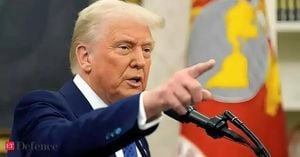On August 20, 2025, the long-simmering legal battle over the release of grand jury materials in the Jeffrey Epstein criminal case reached another impasse, as Federal Judge Richard Berman refused to unseal transcripts and exhibits from the investigation. The decision, which marks the third consecutive rejection of such requests by federal judges, highlights the enduring complexity and controversy surrounding the government’s handling of Epstein’s files—and the persistent calls for transparency from politicians, the public, and even members of former President Donald Trump’s own base.
Judge Berman’s ruling was unambiguous. He described the Trump administration’s request for the grand jury records as a “diversion” from the “trove” of Epstein documents, interviews, and exhibits—roughly 100,000 pages—that the government already possesses. “A significant and compelling reason to reject the request is that the government has already undertaken a comprehensive investigation into the Epstein case and, not surprisingly, has assembled a ‘trove’ of Epstein documents, interviews, and exhibits,” Berman wrote, according to CNN. The judge emphasized that these existing files “dwarf the 70 odd pages of Epstein grand jury materials.”
In his written opinion, Berman noted, “The information contained in the Epstein grand jury transcripts pales in comparison to the Epstein investigation information and materials in the hand of the Department of Justice.” He further argued that the government itself is the logical party to make a comprehensive disclosure of the Epstein files to the public, stating, “By comparison, the instant grand jury motion appears to be a ‘diversion’ from the breadth and scope of the Epstein files in the government’s possession.”
The decision comes amid mounting pressure on the Trump-era Department of Justice to release more information about the notorious sex offender’s case. As The Wall Street Journal and CNBC reported, President Trump had directed the DOJ in mid-July to seek grand jury materials, following his campaign promise to declassify the Epstein files. Yet, after an initial “first phase” of declassification in February 2025 produced virtually no new information, the Justice Department began to walk back its commitments in May, downplaying the situation and eventually issuing an unsigned memo on July 7 stating that “no further disclosure would be appropriate or warranted.”
This lack of transparency has fueled frustration across the political spectrum. According to CNN, Attorney General Pam Bondi released binders to right-wing social media influencers at the White House in February, but those who received them found that the documents revealed little new about the Epstein files. The DOJ’s subsequent reversal on further disclosures only stoked anger among Democrats, the public, and Trump’s own supporters.
Judge Berman is not alone in his stance. On July 23, a federal judge in Florida denied a similar request related to Epstein’s 2008 guilty plea for soliciting prostitution from a minor, ruling that the law did not permit her court to grant the government’s request. Less than three weeks later, on August 11, New York federal Judge Paul Engelmayer also rejected the DOJ’s bid to unseal grand jury records in the criminal case of Ghislaine Maxwell, Epstein’s longtime partner and convicted accomplice. Engelmayer’s opinion was particularly pointed, calling the DOJ’s premise “demonstrably false” and arguing that the request was not a matter of public interest.
In the background, the Department of Justice has continued to explore avenues for releasing more information. Deputy Attorney General Todd Blanche, for instance, conducted a two-day interview with Maxwell on July 24 and 25 at the U.S. Attorney’s Office in Tallahassee, Florida. The DOJ is currently transcribing a 10-hour audio tape from that interview, according to CNN.
Judge Berman’s ruling also cited “possible threats to victims’ safety and privacy” as another compelling reason to keep the grand jury records sealed. This concern has been echoed in previous rulings and reflects the sensitive nature of the materials involved, which include testimony and evidence from victims and witnesses whose identities remain protected by law.
Despite the DOJ’s efforts, the courts have remained steadfast in upholding the precedent of keeping grand jury materials sealed. Berman noted that the Justice Department “did not overcome long-standing precedent to keep grand jury materials sealed,” reinforcing a legal tradition that prioritizes the confidentiality of such proceedings unless a truly compelling public interest can be demonstrated.
Meanwhile, the political intrigue around the Epstein files has only deepened. Senator Dick Durbin, D-Ill., alleged last month that FBI personnel were instructed to “flag” any Epstein records mentioning Trump. The Wall Street Journal reported that Attorney General Pam Bondi informed Trump in May that his name appeared multiple times in the files. The same outlet also revealed that an album of letters compiled for Epstein’s 50th birthday in 2003 included a “bawdy” message bearing Trump’s signature—a claim that Trump has denied, prompting him to file a defamation lawsuit against the newspaper and media mogul Rupert Murdoch.
The broader context is hard to ignore. Trump and Epstein were once friends, but reportedly had a falling out years before Epstein’s suicide in a New York jail in 2019 while facing federal sex-trafficking charges. The political stakes around the Epstein files remain high, with both Trump’s critics and supporters demanding clarity on the extent of his involvement, if any, in Epstein’s affairs.
For now, the government’s “trove” of documents—interviews, exhibits, and investigative files—remains largely under wraps, with only a fraction of its contents publicly disclosed. The DOJ, according to CNN, has repeatedly insisted that further disclosure is neither appropriate nor warranted, a position that has been upheld by every federal judge asked to rule on the matter.
Still, the story is far from over. As the DOJ works to transcribe and potentially review new interviews, and as political and public pressure continues to mount, the question of what the Epstein files truly contain—and what, if anything, they reveal about the powerful figures named within—remains a source of speculation, frustration, and, for many, a lingering sense of unfinished business.
With the courts drawing a firm line on the release of grand jury materials, the next chapter in the Epstein files saga will likely depend on the government’s willingness to make good on its past promises of transparency—or on the persistence of those determined to keep demanding answers.



